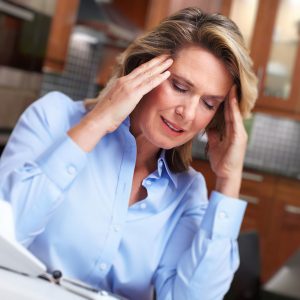The statistics surrounding mental health and mental illness in Australia are alarming. While we continue to embrace a health system that is focused on addressing physiological and physical issues such as osteoarthritis, type 2 diabetes and obesity, a new challenge to Health Professionals has risen, with an alarming prevalence in today’s society.
Did you know that approximately 1 MILLION Australian adults suffer from depression, and a further 2 MILLION with anxiety? (1)
What is even more concerning is the fact that it is not uncommon to see these mental illnesses paired in conjunction with each other, which represents a significant challenge to Healthcare providers nationwide. These very real issues must be addressed, much like physical issues to enhance and optimise overall quality of life.
What is Depression?
While the exact cause of depression is not known, it is commonly associated with a combination of both physiological and psychological factors, as opposed to a singular isolated catalyst. Thought to occur via environmental and neurochemical triggers, depression refers to a state of mood whereby a person’s recurring thoughts, behaviour and overall feeling of mental wellbeing are affected, leading to common feelings of hopelessness, sorrow, lethargy and sadness. Associated physical symptoms such as fatigue, pain and digestive issues are also thought to occur in persons with depression, and while it can affect a large portion of the population, it remains entirely individual in it’s presentation, and can vary in each individual. (2)
For more information on Depression, the following resources provide a wealth of helpful information:
https://www.beyondblue.org.au/the-facts/depression
http://www.blackdoginstitute.org.au/public/depression/depressionexplained/index.cfm
https://www.sane.org/mental-health-and-illness/facts-and-guides/depression
What is Anxiety?
Whilst we all can at one point or another, experience a certain worry or fear regarding a certain event, people suffering from Generalized Anxiety Disorder (GAD) struggle to cope with the excessive worry and fear that the illness can present itself with. Rather than the worry and panic like symptoms passing over time, people with GAD will dwell on these thoughts and can find coping with daily life situations with difficult. Whilst anxiety encompasses many different types such as Agoraphobia and Obsessive Compulsive Disorder, this article purely focuses on Generalised Anxiety Disorder. Symptoms of Anxiety include excessive panic and worry, obsessive thoughts and routines, and physical manifestations such as a feeling of tightness in the chest and shallow, rapid breathing. (3)
For more information on Anxiety and it’s different forms, the following resources provide a wealth of helpful information:
https://www.beyondblue.org.au/the-facts/anxiety
https://www.sane.org/mental-health-and-illness/facts-and-guides/anxiety-disorder
http://www.anxietyaustralia.com.au/anxiety-disorders/
What can we do about it?
To complement other proven and successful therapy measures such as pharmacology and cognitive behavioural therapy, exercise is fast becoming an important foundation towards good mental health. Whilst the exact nature of how exercise influences individual brain chemistry and the surrounding environmental perception, we do know that exercise can play a vital role in the maintenance, and in some cases improvement of the symptoms of mental illness.
Accredited Exercise Physiologists play an important role in assisting those suffering from a mental illness, as part of a conjoint multidisciplinary team including General Practitioners and Clinical Psychologists/Psychiatrists, and should always be considered when formulating a care plan for any patient.
Exercise has been shown to have the following benefits on Mental Health & Illness:
– Increased Feelings of Wellbeing and Improved Mental State (4)
– Management of Side Effects from Medication Use (5)
– Temporarily Alleviate the Symptoms Associated with Depression (6)
– Reduce Anxiety Sensitivity (7)
– Can Improve Sleep and Reduce Insomnia (8)
In some scenarios, a mental illness can be an associated co-morbidity behind physical ailments such as hypertension, type 2 Diabetes and as previously mentioned, obesity and the metabolic syndrome, all of which can also be addressed by Accredited Exercise Physiologists.
The team at Active Seniors are all University Qualified Allied Health Professionals who can prescribe exercise that is safe and entirely specific and individual focused. Exercise Physiologists will always place the client at the centre of suitable exercise prescription to ensure all patient safety and wellbeing is maintained.
If you know of someone who you think you would benefit from exercise, do not hesitate to contact the team at Active Seniors to arrange an appointment.
Written by Phil Caruso
References
National Survey of Mental Health and Wellbeing, Australian Bureau of Statistics, 2007
https://www.beyondblue.org.au/the-facts/depression
https://www.beyondblue.org.au/the-facts/anxiety
Galper, D. I., Trivedi, M. H., Barlow, C. E., Dunn, A. L., & Kampert, J. B. (2006). Inverse association between physical inactivity and mental health in men and women. Medicine and Science in Sports and Exercise, 38(1), 173.
Australian, R. (2009). Royal Australian and New Zealand College of Psychiatrists clinical practice guidelines for the treatment of schizophrenia and related disorders. Australian and New Zealand journal of psychiatry.
Craft, L. L., & Perna, F. M. (2004). The benefits of exercise for the clinically depressed. Primary care companion to the Journal of clinical psychiatry, 6(3), 104.
Carek, P. J., Laibstain, S. E., & Carek, S. M. (2011). Exercise for the treatment of depression and anxiety. The International Journal of Psychiatry in Medicine, 41(1), 15-28.
Reid, K. J., Baron, K. G., Lu, B., Naylor, E., Wolfe, L., & Zee, P. C. (2010). Aerobic exercise improves self-reported sleep and quality of life in older adults with insomnia. Sleep medicine, 11(9), 934-940.

